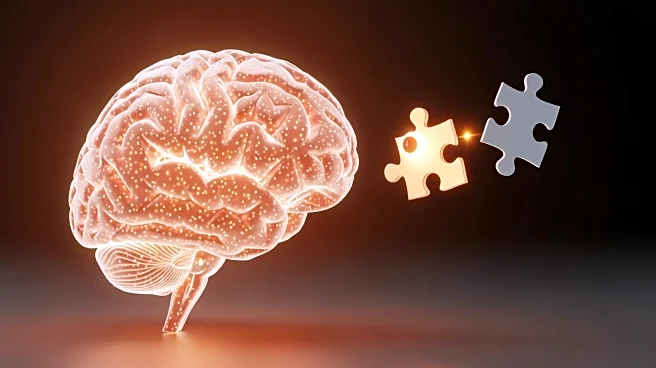What's Happening?
A recent study conducted by researchers at the Salk Institute for Biological Studies has identified a molecule, pleiotrophin, that may play a crucial role in the development and function of the nervous system, particularly in individuals with Down syndrome.
The study, which utilized lab mice, suggests that restoring pleiotrophin could enhance brain function in Down syndrome and other neurological diseases. The research team, including Ashley N. Brandebura, PhD, found that administering pleiotrophin improved brain function in adult mice, indicating potential advantages over previous methods that required precise timing during pregnancy. The study highlights the possibility of using astrocytes to deliver synapse-modulating molecules to rewire brain circuitry at adult ages.
Why It's Important?
The findings from this study could have significant implications for the treatment of Down syndrome, which affects approximately one in 640 babies born annually in the U.S. The condition is associated with developmental delays and increased risk for various medical issues. By potentially improving brain function through the restoration of pleiotrophin, this research offers hope for enhancing the quality of life for individuals with Down syndrome. Moreover, the approach could be applicable to other neurological disorders, such as fragile X syndrome and Alzheimer's disease, by inducing brain plasticity through astrocytes. This could lead to new therapeutic strategies for a range of neurodevelopmental and neurodegenerative conditions.
What's Next?
Further research is needed to fully understand the complex contributors to Down syndrome and to validate the efficacy of pleiotrophin restoration in humans. The researchers caution that pleiotrophin is not the sole cause of brain circuit issues in Down syndrome, and additional studies are required to explore other factors. Ashley N. Brandebura plans to continue her research at UVA Health, focusing on the potential of astrocytes to deliver synaptogenic molecules for various neurological disorders. The ongoing research aims to develop effective gene therapies or protein infusions that could be used in clinical settings to improve brain function in Down syndrome and other conditions.
Beyond the Headlines
The study opens up new avenues for understanding the role of astrocytes in brain plasticity and their potential in delivering therapeutic molecules. This approach could revolutionize the treatment of neurological disorders by targeting specific cell types to induce beneficial changes in brain circuitry. The ethical and practical implications of such treatments will need careful consideration, particularly in terms of accessibility and long-term effects. As research progresses, it may also lead to broader discussions on the integration of gene therapy and protein infusions in standard medical practice.

















